Elías Santana Bermúdez y Carmen Correa Cabrera
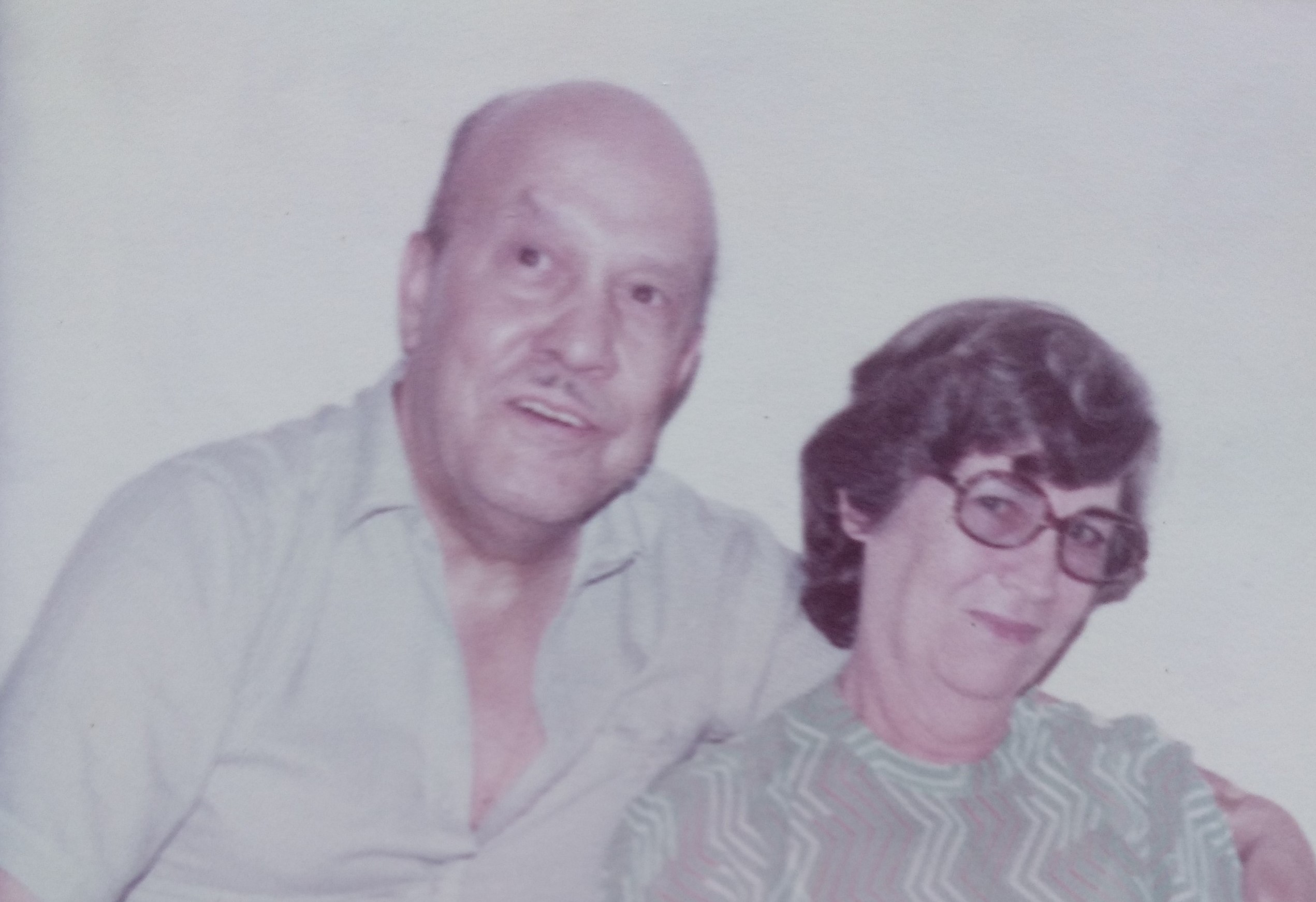
En los años cincuenta, antes de fundar su empresa, fue Guardia Civil, Vendedor de Jabón en el Mercado de Vegueta y Vendedor de Papelería. (1950s, before founding his company, he was Civil Guard, Soap Seller, Stationery Seller)
Mis dos abuelas vivían una enfrente de otra, en la calle Hernán Pérez, del barrio de Vegueta, Las Palmas de Gran Canaria. La abuela Santana, Filomena, subiendo hacia el Paseo de San José a la izquierda, después de la Academia Nuez Aguilar, y justo antes de la esquina donde había un garaje subterráneo, que al parecer, si lo pasabas, llegabas a la calle Ventura Ramírez del Torrecine. Esa bajada me daba miedo, así que nunca la bajé. Justo enfrente la abuela Correa, Mamaíta, que según mi tío Agustín Correa cuando nació rompió el molde.
La casa de Abuela Filomena, la de los Santana, mirando desde la acera de enfrente, tenía una puerta y a la izquierda, algo más subida, una ventana. La puerta daba a un descansillo y a cuatro o cinco escalones que daban a otra puerta a la altura de la ventana exterior. Cuando abrías esa segunda puerta te encontrabas con un pasillo muy largo, justo a la izquierda una pequeña sala de estar que daba a la ventana exterior, y en todo el lado izquierdo de ese pasillo tres o cuatro habitaciones que finalizaban en un patio a la izquierda al fondo y una cocina a la derecha. Después del patio y de la cocina, a la derecha estaba el baño de la casa con una bañera enorme, a la izquierda otra habitación (la de los abuelos), una escalera que subía a la azotea y al final de todo a la izquierda un trastero muy estrecho.
Abuela Filomena (Santana)
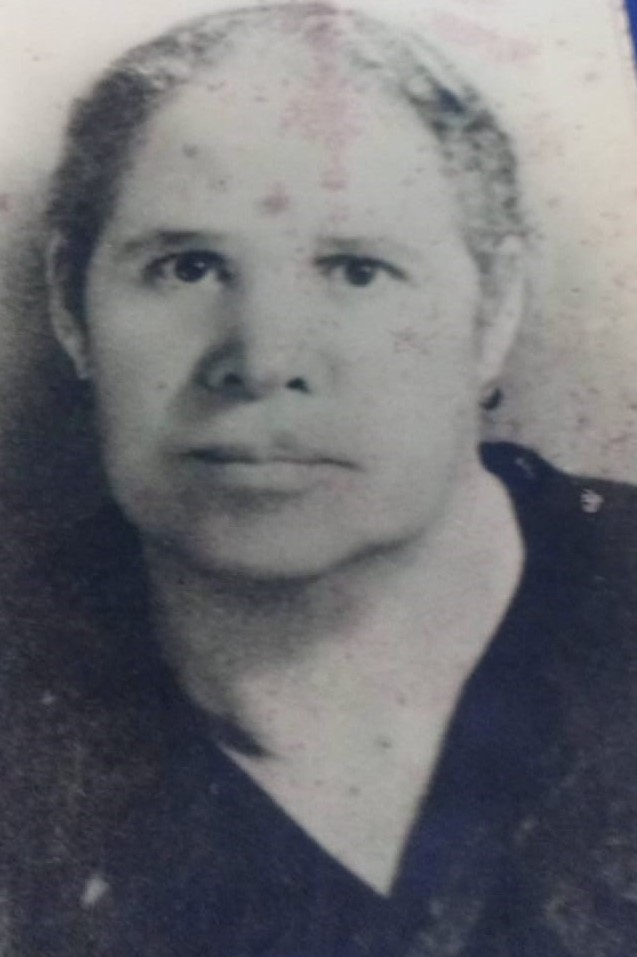
La casa de Mamaíta, la de los Correa, era un laberinto muy diferente. Una puerta muy grande en la calle, que daba a un descansillo de dos metros con otra puerta a partir de la que comenzaba un pasillo larguísimo, una escalera a una parte superior donde vivía otra familia, a la izquierda una puerta a la casa de mamaíta, que a su vez en la calle aparecía con una ventana y una puerta más arriba de la puerta grande de entrada. El pasillo continuaba hasta un patio al fondo donde estaba la cocina y el baño, y otra escalera interior que subía a otras dependencias. En ese pasillo a la derecha una habitación que también era de los Correa.
Abuela Mamaita (Correa)
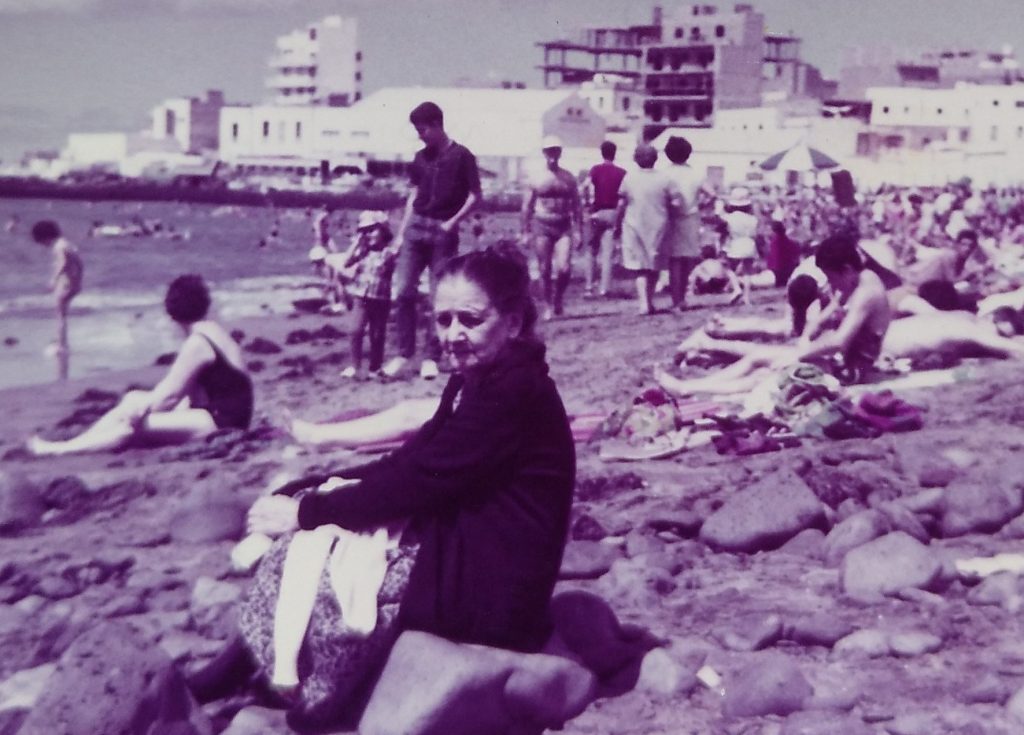
Dos casas muy distintas para dos familias distintas. Filomena era bondadosa y humilde, muy de su casa, como lo fueron todos sus hijos; Mamita tenía mucho carácter, respetaba y se hacía respetar, era el centro de toda la familia Correa, una costurera artesanal que hacía magníficas camisas, que se había quedado viuda muy joven y sacaba adelante a toda su familia numerosa, algo muy difícil de ver para la época. Una mujer impresionante, que mantenía unida a su familia a pesar de las grandes dificultades de esos años. En su casa no faltaba nunca café, un buen café, el café de los Correa.
Pero hablamos de Elías Santana Bermúdez, mi padre. Se casó con Carmen Correa, entró en la Guardia Civil, lo destinaron cuando la guerra a Fuengirola, en Málaga, donde vivió unos pocos años con mis dos hermanos mayores y una recién nacida Mari Carmen. Corría más o menos el año 1949. Yo no había nacido, así que solo se de referencias que no estuvo en la primera línea de la guerra, y que para sobrevivir tenía que canjear aceite por comida.
De vuelta a Las Palmas dejó la Guardia Civil y fabricaba jabón de aquella época para venderlo en la plaza del mercado de Vegueta. Y no sé por qué razón, quizás influido por mi abuelo que era empleado de una empresa de papelería, montó un pequeño almacenillo con lápices y libretas, en aquel trastero al fondo de la casa de la abuela Filomena, y comenzó a vender artículos de papelería que metía en un saco, se iba en guagua hasta el puerto y pateaba la Isleta vendiendo sus productos en los bazares de un barrio que comenzaba a ser muy importante gracias al Puerto de la Luz. Así todos los días en los años cincuenta.
Elías Santana se demostraba así mismo que podía sacar a su familia adelante con su duro trabajo de venta ambulante de papelería. Era un buen hombre, se veía fácilmente, y con su empeño y sus dotes comerciales se ganó poco a poco a una clientela fiel que le pedía cada vez más, y confiaba cada vez más, en ese hombre del saco que subía las calles de la Isleta, caminando, cargado hasta los topes, y que venía del otro lado de la ciudad. Yo era muy pequeño, apenas unos pocos años, y recuerdo ver aquel almacenillo con una estantería muy larga, entrando a la derecha, donde tenía por lo menos lápices, gomas y papel.
A mediados de los sesenta dejó el almacenillo de la calle Hernán Pérez, en la casa de abuela Filomena, y abrió un local en la calle Rabadán, casi esquina con Canalejas, llamando a su empresa Distribuidora Rabadán. Yo nací en 1951, así que tendría unos catorce años, y cuando me pasaba la mañana en Rabadán jugaba con los amigos al futbol en el patio del Colegio Claret. Recuerdo que en uno de esos partidos llegó un chico algo mayor que nosotros, cogió la pelota al principio del patio, y sorteando uno tras otro a todos, marcó el gol en la puerta de más arriba. Después se puso a tirar al aro en la cancha del colegio. Justo enfrente del local de Distribuidora Rabadán vivía Carmelo Cabrera, un año mayor que yo, que poco después ficharía por el Real Madrid de Baloncesto y se convirtió en el mejor base de la historia del basket español. Mi padre, en aquel entonces, ya era Don Elías para todos. Recuerdo también los bocadillos que preparaba una tienda justo en la esquina de Canalejas, con mantequilla, queso y conserva, todo un precursor de los bocatas de hoy.
Don Elías era un gran comerciante, y como ejemplo diré que al entrar en Distribuidora Rabadán, en esos comienzos de la calle Rabadán, en la parte superior se veía un altillo lleno de cajas. Mi sorpresa fue que me enteré que esas cajas estaban vacías, y que por eso los pedidos se entregaban al día siguiente para tener tiempo de comprar los productos sin tener que almacenarlos. ¡Usaba el Dropshipping en los años sesenta!……… Don Elías generaba confianza en todos los clientes, y poco a poco su buen nombre, de comerciante trabajador y honrado, consiguió que Distribuidora Rabadán se hiciera con todos los clientes de Papelería de Gran Canaria. Distribuidora Rabadán no paró de crecer hasta convertirse en la más importante distribuidora de papelería de Canarias, y tuvo que cambiar su local de la calle Rabadán a uno mucho más grande en la calle Buenos Aires. Allí estuvo un par de años hasta que compró, a finales de los sesenta, su propio almacén en la calle Eusebio Navarro, y generando empleo y negocio hasta los años ochenta.
Mi padre y Distribuidora Rabadán, y mis hermanos mayores Santiago y Gerardo, me enseñaron mucho sobre la empresa y la venta, que después me sirvió para mi vida profesional, que se desarrolló fuera de la empresa familiar. Cuando era estudiante todos los veranos trabajaba un mes en Rabadán. Empaquetando pedidos, ayudando al repartidor con las entregas en los clientes, vendiendo postales. Un año antes de entrar al servicio militar estuve en las oficinas, con la administración. Hice un viaje con mi padre a Valencia, donde estaban los proveedores más importantes. Recuerdo que los proveedores de la Península, cuando nos visitaban en las oficinas, le pedían a mi padre ese café tan fuerte que habían probado anteriormente, y varias veces me tocó ir a casa a recogerlo. El café de los Correas.
De Distribuidora Rabadán destaco a Don Elías. Eminentemente un buen hombre, un comerciante trabajador, perseverante, honrado, honesto, que generaba confianza y ganaba clientes. Creó una gran empresa, de la que estaba muy orgulloso el abuelo Elías que se sentaba en una silla en la entrada de Eusebio Navarro a saludar a todo el que llegaba.
Elías Santana y Distribuidora Rabadán, una gran empresa de los años sesenta y setenta en Gran Canaria. Distribuidora Rabadán cerró en los años noventa después de unos últimos años muy duros y difíciles, pero eso se queda en los rincones de la memoria.
Distribuidora Rabadán organizó eventos para sus empleados y clientes, como comidas y entregas de premios y equipos de futbol de empresa. Algunas fotos de sus equipos de futbol.
Distribuidora Rabadán organized events for its employees and customers, such as awards meals and deliveries and company football teams. Some pictures of your football teams.
CLUB DE FUTBOL DISTRIBUIDORA RABADAN (Campeonatos de Empresa, 1960-1970)
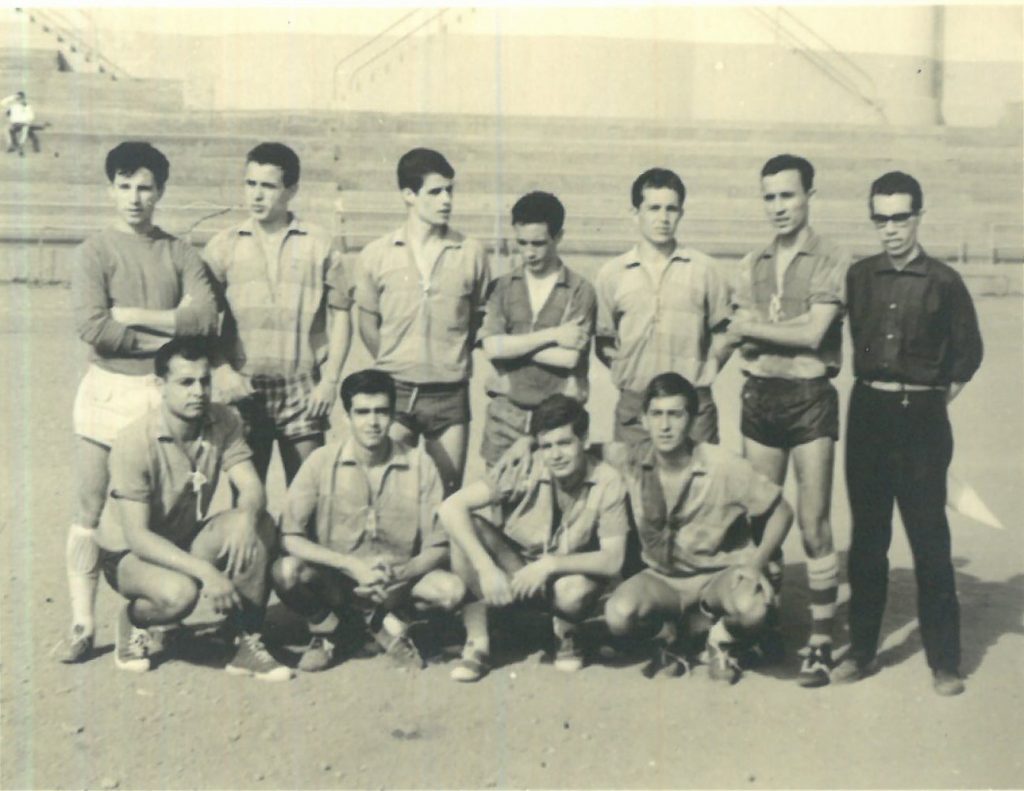
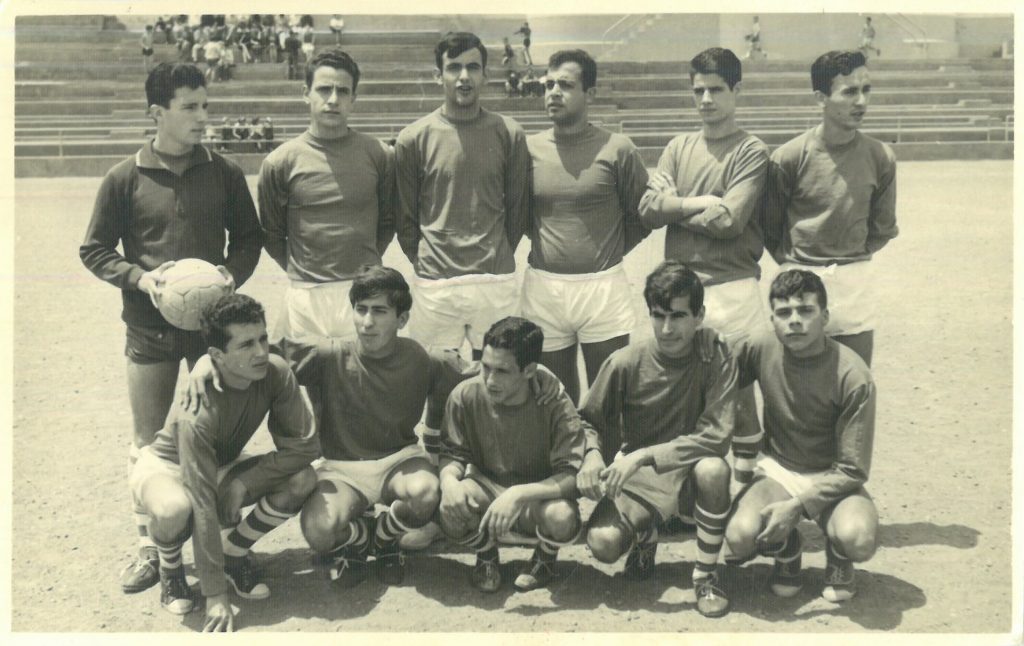
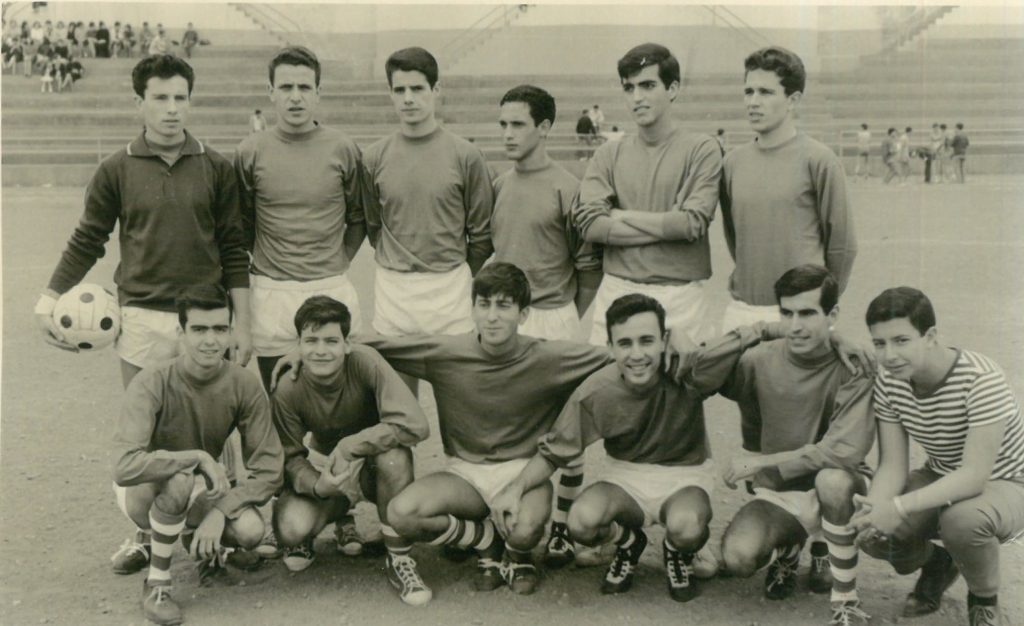
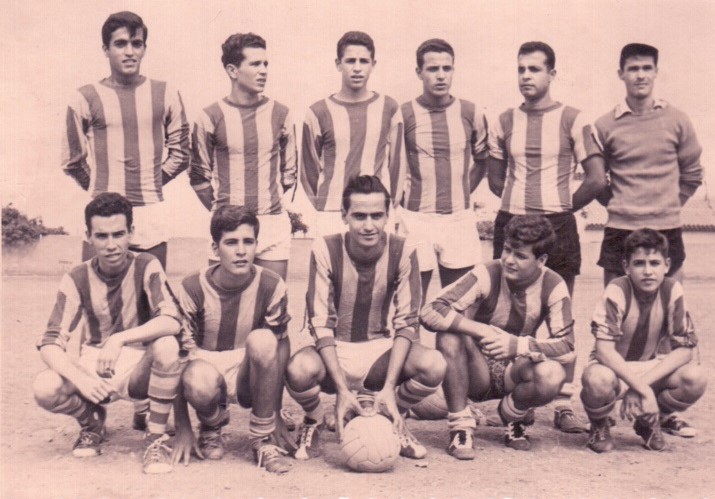
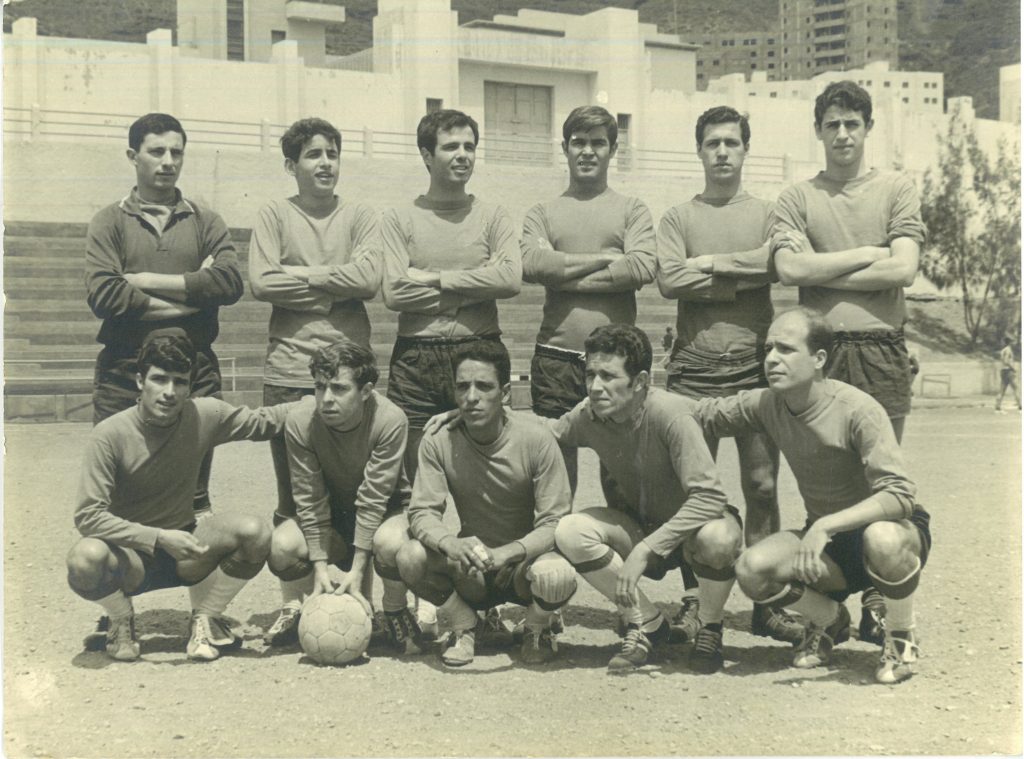
C.F. Rabadán quedó Campeón en alguna temporada. En la foto Antonio Pantaleón y Antonio Armas recogiendo los trofeos. Champion in a few seasons.
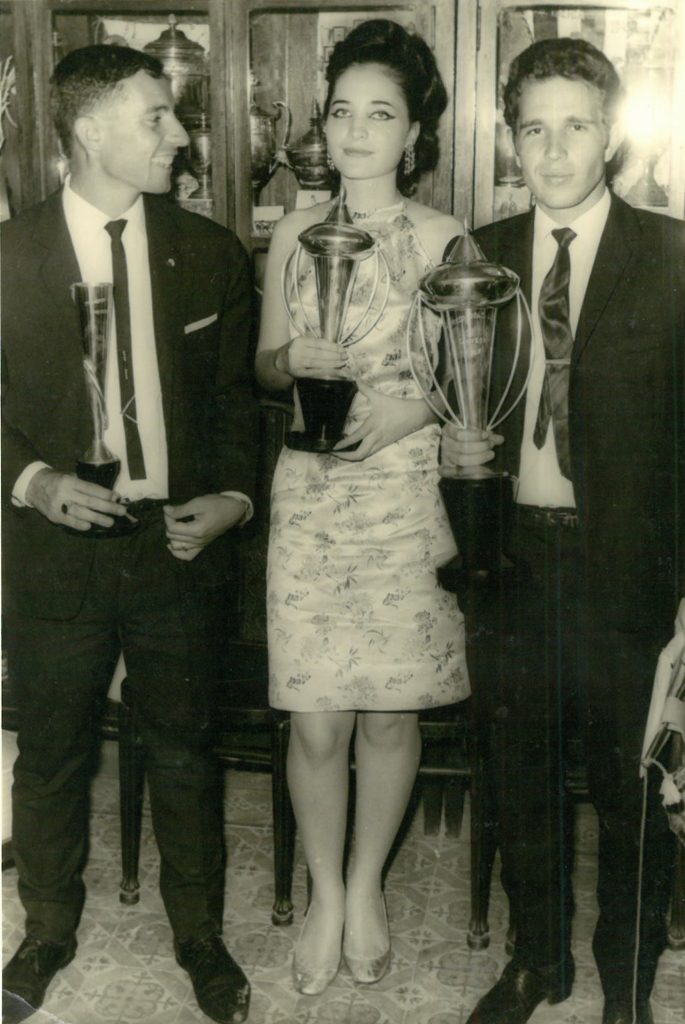
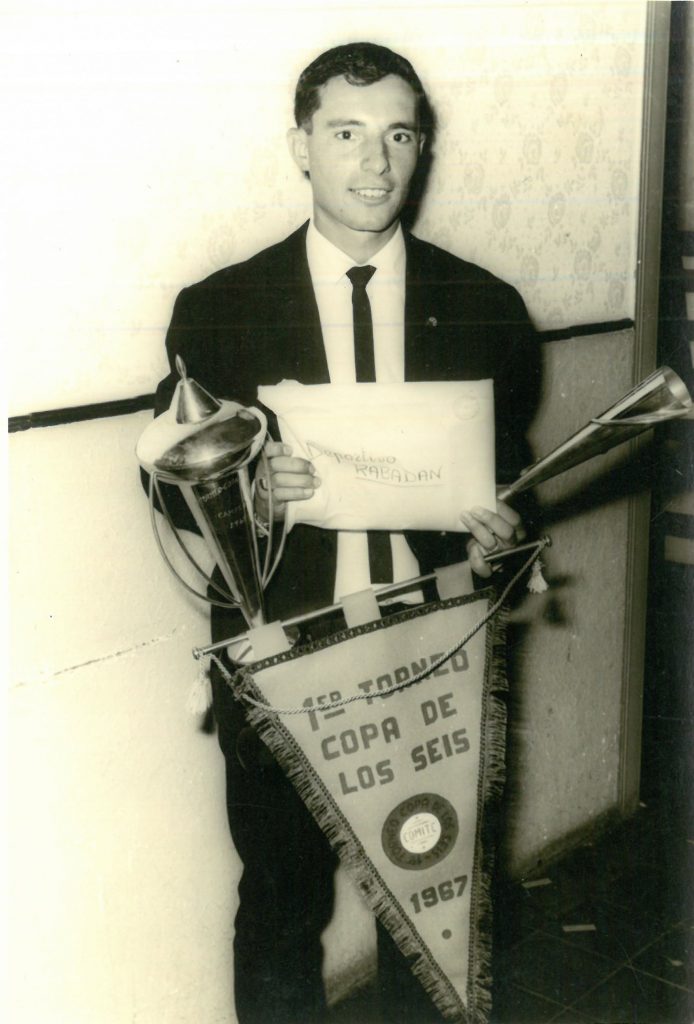
English
My two grandmothers lived opposite each other, on Hernán Pérez Street, in the neighborhood of Vegueta, Las Palmas de Gran Canaria. Grandma Santana, Filomena, going up to paseo de San José on the left, after the Academia Nuez Aguilar, and just before the corner where there was an underground garage, which apparently, if you passed it, you would reach Ventura Ramírez del Torrecine street. That descent scared me, so I never put it down. Right in front of Grandma Correa, Mamaita, who according to my uncle Agustín Correa when she was born broke the mold.
Grandma Filomena’s house, the Santana house, looking from the sidewalk across the street, had a door and on the left, something more up, a window. The door overlooked a landing and four or five steps that overlooked another door at the height of the outside window. When you opened that second door you found a very long hallway, just to the left a small living room facing the outside window, and all over the left side of that hallway three or four bedrooms ending in a patio on the left in the background and a kitchen on the right. After the patio and the kitchen, on the right was the bathroom of the house with a huge bathtub, on the left another room (that of the grandparents), a staircase that went up to the roof and at the end of everything on the left a very narrow storage room.
Mamaíta’s house, that of the Correa, was a very different labyrinth. A very large door in the street, which overlooked a two-metre landing with another door from which began a very long corridor, a staircase to a top where another family lived, on the left a door to the mamaita house, which in turn on the street appeared with a window and a door above the large entrance door. The hallway continued to a courtyard in the back where the kitchen and bathroom were, and another internal staircase that went up to other outbuildings. In that hallway on the right a room that was also of the Correa.
Two very different houses for two different families. Philomena was kind and humble, very much of her home, as were all her children; Mamita had a lot of character, respected and respected, was the center of the entire Correa family, a handcrafted seamstress who made shirts for the Cardona Warehouses, who had become a very young widow and brought her whole large family forward, something very difficult to see at the time. An impressive woman, who kept her family together despite the great difficulties of those years. In his house there was never a lack of coffee, a good coffee, the coffee of the Correa.
But we’re talking about Elijah Santana Bermúdez, my father. He married Carmen Correa, entered the Civil Guard, was assigned when the war to Fuengirola, in Malaga, where he lived for a few years with my two older brothers and a newborn Mari Carmen. It was about 1949. I wasn’t born, so I just know from references that he wasn’t on the front line of the war, and that to survive I had to exchange oil for food.
Back in Las Palmas he left the Guardia Civil and made soap from that time to sell it in the market square of Vegueta. And I don’t know why, perhaps influenced by my grandfather who was an employee of a stationery company, set up a small warehouse with pencils and notebooks, in that storage room at the bottom of Grandma Philomena’s house, and began selling stationery that he put in a sack, went in guagua to the port and kicked the Isleta selling his products in the bazaars of a neighborhood that was beginning to be very important thanks to the Port of the Light. So every day in the fifties.
Elijah Santana was also shown that he could get his family through with his hard work selling street stationery. He was a good man, he looked easily, and with his commitment and his commercial skills he gradually earned a loyal clientele who asked him more and more, and trusted more and more, that man in the sack who climbed the streets of the Isleta, walking, loaded to the tops, and who came from the other side of the city. I was very small, just a few years old, and I remember seeing that warehouse with a very long shelf, entering the right, where I had at least Staedtler pencils, rubbers and paper. That’s my memory.
In the mid-1960s he left the warehouse of Hernán Pérez Street, in the filomena grandmother’s house, and opened a place on Rabadán Street, almost corner with Canalejas, calling his company Distribuidora Rabadán. I was born in 1951, so I was about fourteen years old, and when I spent the morning in Rabadán I played football with friends in the courtyard of Claret College. I remember that in one of those matches a guy came a little older than us, took the ball at the beginning of the yard, and by walking one after the other at all, he scored the goal at the door above. Then he started throwing the hoop on the school court. Right in front of the place of Distribuidora Rabadán lived Carmelo Cabrera, who soon after signed for Real Madrid de Baloncesto and became the best base in the history of Spanish basketball. My father, back then, was already Don Elijah to all. I also remember the sandwiches prepared by a shop right on the corner of Canalejas, with butter, cheese and preserves, a precursor to today’s sandwiches.
Don Elijah was a great merchant, and as an example I will say that upon entering Distribuidora Rabadán, in those early Rabadán Street, at the top you could see a mezzanine full of boxes. My surprise was that I found out that those boxes were empty, and that’s why orders were delivered the next day to have time to buy the products without having to store them. I used Dropshipping in the sixties!……… Don Elías generated trust in all customers, and gradually his good name, as a hardworking and honest trader, got Distribuidora Rabadán to take over all the customers of Stationery of Gran Canaria. Distribuidora Rabadán continued to grow to become the most important stationery distributor in the Canary Islands, and had to change its premises from Rabadán Street to a much larger one on Buenos Aires Street. There he spent a couple of years until he bought, in the late sixties, his own warehouse on Eusebio Navarro Street, and generating jobs and business until the 1980s.
My father and Distribuidora Rabadán, and my older brothers Santiago and Gerardo, taught me a lot about the company and the sale, which later served me for my professional life, which developed outside the family business. When I was a student every summer I worked for a month in Rabadán. Packing orders, helping the delivery man with deliveries on customers, selling postcards. A year before I entered military service, I was in the offices, with the administration. I took a trip with my father to Valencia, where the most important suppliers were. I remember that the suppliers of the Peninsula, when they visited us in the offices, asked my father for that coffee so strong that they had tried before, and several times it was my time to go home and pick it up. The coffee from the Straps.
From Distribuidora Rabadán to Don Elías. Eminently a good man, a hardworking trader, persevering, honest, honest, who generated trust and gained customers. He created a great company, of which Grandpa Elijah was very proud that sat in a chair at the entrance of Eusebio Navarro to greet everyone who arrived.
Elías Santana and Distribuidora Rabadán, a large company of the sixties and seventies in Gran Canaria. Distribuidora Rabadán closed in the 1980s after a very tough and difficult last few years, but that stays in the corners of the heart.
